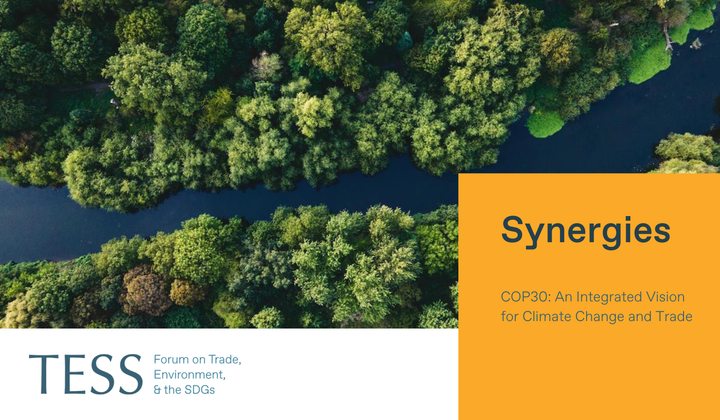Over the coming years, a top task for governments and stakeholders will be to forge a global cooperation agenda on trade, climate, and sustainable development. This article outlines the contours of a seven-part agenda. Importantly, advancing such cooperation will require connecting the dots between climate and trade processes at the international level along with investment in integrated policymaking processes nationally and regionally, ensuring that approaches to climate and trade are grounded in sustainable development and equity considerations.
This article is part of a Synergies series on climate and trade curated by TESS titled Addressing the Climate Crisis and Supporting Climate-Resilient Development: Where Can the Trading System Contribute? Any views and opinions expressed are those of the author(s) and do not necessarily reflect those of TESS or any of its partner organizations or funders.
-----

Discussions over recent years on the trade, climate, and sustainable development nexus have highlighted the extraordinary complexity of the issues at hand as well as the many perspectives and concerns that need to be reconciled. Yet growing consensus is emerging around a simple fact: there are no credible pathways to tackle the climate crisis without trade and trade policies aligned with the Paris Agreement objectives. Critically, not only is such alignment an essential component of any global strategy to reduce greenhouse emissions, adapt to climate change, and foster climate-resilient development to be effective and just, it will require inclusive international cooperation.
There are no credible pathways to tackle the climate crisis without trade and trade policies aligned with the Paris Agreement objectives.
At a time of growing tensions on a range of trade and trade-related measures with climate objectives, there is mounting recognition that a patchwork of uncoordinated initiatives is generating challenges of transparency, effectiveness, and equity, while generating avoidable costs for business. Amidst clear evidence that some trade flows and policies are directly contributing to rising greenhouse gas emissions, there are a range of proposals for how trade cooperation can make a positive contribution to the global climate agenda, from calls to harness trade disciplines to reform environmentally harmful subsidies that slow the transition to net zero to proposals for facilitating development, diffusion, access, uptake, and rapid scaling up of technologies, goods, and services vital for decarbonization, climate adaptation, and resilience.
As governments meet at the 2025 UN Climate Change Conference (COP30), this is a timely moment to reflect on what a comprehensive and strategic approach to cooperation on trade, climate, and sustainable development could look like, and crucially, how to shape a cooperative agenda that is inclusive. In so doing, a critical task is to focus on approaches to climate action that generate economic opportunities and prosperity, while responding to the socio-economic vulnerabilities and structural handicaps of developing countries, and avoiding unfair adjustment burdens or marginalizing them in the transition process.
Given the multidimensional nature of the challenges at hand, addressing the nexus of climate, trade and sustainable development will require connecting the dots between multiple international processes and breaking traditional silos prevailing in the international arena.
Given the multidimensional nature of the challenge, addressing such issues requires connecting the dots between multiple international processes and breaking traditional silos prevailing in the international arena.
An Agenda for Inclusive Cooperation
Over the coming years, the contours of a global cooperation agenda on trade, climate, and sustainable development could be articulated around the following set of key priorities.
(i) Managing and Reducing Climate-Trade Tensions
The array of trade-related policies governments are implementing or considering to achieve their climate goals range from border carbon adjustment measures, climate standards, and due diligence requirements through to green industrial policies and strategies to secure access to critical minerals. The fragmented nature of the growing number of domestic trade-climate measures, combined with their potential effects on trade and development, has resulted in competitiveness tensions among trading partners and significant compliance costs for businesses. Developing countries, in particular, fear that these measures could further marginalize them and affect their participation in international supply chains; highlighting the need for approaches that are fair and reflect wider, long-standing development priorities.
As these tensions threaten progress on both climate and development, a foremost challenge for international cooperation is to reduce fragmentation and differences in approaches. While harmonizing existing trade-climate measures at the global level is unlikely to occur, there is mounting recognition that international cooperation in this area is needed to foster coherence in the development of such measures, enhance transparency, and promote interoperability, mutual recognition, or equivalences among different policy approaches and processes while at the same time taking into account development considerations.
(ii) Bolstering Clean Energy Access and Transition
The transition to a net-zero emission global economy will rely heavily on resilient supply chains for critical minerals such as lithium, cobalt, nickel, manganese, and graphite as well as rare earth elements, which are essential to manufacture batteries, wind turbines, solar panels, electric vehicles, and other technologies vital for the clean energy transition. Yet, competing demands on critical minerals and the risk of supply chain disruptions are increasingly generating concerns among businesses engaged in the clean energy sector, as well as stakeholders concerned about tensions slowing climate action. While a number of large resource-dependent economies are deploying a variety of approaches to “secure” reliable critical mineral supplies as part of both competitiveness and economic security strategies, resource-rich developing countries are focused on implementing trade-related strategies that promote value addition, economic diversification, and green industrialization. Cooperative arrangements will be essential to ensure resilient supply chains while maximizing benefits for resource-rich developing countries and promoting sustainable development opportunities.
(iii) Fostering Cooperation on Green Industrial Policies
There is broad recognition that public interventions will be required to accelerate the clean energy transition while contributing to climate-resilient development. Here, there is growing emphasis from a range of governments in harnessing green industrial policies—from subsidies and subsidies reform to measures related to investment, government procurement, and technology. At one end of the spectrum, some argue that market-correcting policies are essential to catalyse and shape private financial flows to address the climate crisis. Alongside, there is broad recognition that achieving net zero will require a shift away from industrial policies that have long supported fossil fuels, such as through fossil fuel subsidy reform. Others fear that some forms of government intervention, such as green subsidies, may generate negative economic externalities, including unfair and undue impacts on the competitiveness of developing countries without the fiscal space to match such subsidies, and undermine investment and other financial flows toward them. Striking the right balance between the potential benefits of different industrial policy instruments and the varying abilities of governments to use such policies as well as their possible production and trade-distorting effects will require close international cooperation.
(iv) Accelerating Decarbonization of Key Industrial Sectors
A just transition to a low-carbon economy will require massive decarbonization of key industries such as steel, cement, or aluminium, which are heavily traded commodities and generate about one quarter of global carbon emissions. It will also require a shift away from energy systems driven by fossil fuels. In emerging markets and developing countries, the deployment of decarbonization technologies faces several obstacles, including high costs of both technology and capital, policy and financing challenges, as well as complexities around the adaptation of new and existing technologies to specific contexts. Sector specific cooperation on trade-related policies and successful approaches to technology co-development will have to play a critical role in fostering such transformation.
Another critical sector for international trade cooperation is shipping, which plays a key role in today’s global interconnected economy, transporting close to 90% of internationally traded goods by sea, and accounting for about 3% of global emissions. The International Maritime Organization has set clear ambitions for the sector’s full decarbonization, yet concrete measures—both economic and technical—for delivering on this strategy still need to be agreed and implemented. These are likely to shape the shipping industry for decades and influence global trade patterns, with implications for all countries, but particularly developing and least developed countries and small island developing states. states. Equitable cooperation that addresses developing country concerns will thus be vital.
(v) Promoting Sustainable Agriculture and Food Systems
Agriculture represents a critical source of food, feed, fuel, and livelihoods. Yet, the current food system fails to deliver food and nutrition security for all. It also accounts for around 30% of greenhouse gas emissions, when considering the combined emissions of agriculture and land use changes, storage, transport, packaging, processing, retail, and consumption. The immense challenge facing the sector is to improve access, availability, and stability of nutritious food while sustaining livelihoods, protecting ecosystems, restoring biodiversity, and reducing emissions. The case for trade cooperation is particularly clear for measures aimed at removing perverse incentives, such as environmentally harmful agricultural subsidies as envisaged under the Kunming-Montreal Global Biodiversity Framework, or fostering trade in environmentally preferable products. In a similar vein, ensuring that environmental regulations, due diligence requirements, standards, or agriculture-related labelling schemes are applied in a way that minimizes trade frictions and takes into account broader sustainable development imperatives has become a growing priority.
(vi) Advancing Climate-Resilient Development
For the majority of developing countries, which account for a small share of global greenhouse gas emissions, the transition to a low-carbon economy is only viable if it contributes at the same time to poverty reduction, structural economic transformation, employment, and other pressing developmental imperatives. In this context, developing countries have called for various forms of cooperation on trade and investment that can support their efforts to build capacity and competitiveness in key green sectors, achieve greater value-addition, such as in processing of raw materials critical to the climate transition, and foster technology co-development, access, transfer, absorption, and adaptation to local conditions. Notably, trade-related cooperation that supports climate-resilient development will need to respond to both mitigation and adaptation priorities, with economic diversification being a vital strategy for resilience-building. In addition, trade cooperation for climate-resilient development will require consideration of intersecting challenges related to finance, investment, and debt, recognizing that for developing countries with limited fiscal space, high debt burdens, and restricted access to private investment, effective financing mechanisms will be vital for just transitions that respond to sustainable development priorities.
(vii) Supporting Climate Adaption
A wide range of developing countries are already suffering from the physical impacts of climate change, both directly through the effects of more frequent extreme weather events and changing sea levels, and indirectly through climate-induced changes in endowments and comparative advantages. Storms, sea surges, floods, prolonged heatwaves, and droughts affect the price, quality, and availability of essential goods and services. In sectors such as fisheries and agriculture, changes in temperature, precipitation, or the prevalence of pests and diseases affect yields, crop productivity, or natural resource endowments. In this context, developing countries have repeatedly highlighted the need for international support measures to address the economic and trade impacts of the climate crisis, and to support resilience of trade infrastructure and producers to recurring climate shocks. Trade cooperation will also have a vital role to play in offsetting climate-induced production shortfalls, ensuring food security, and facilitating the access, diffusion, and uptake of adaptation-related goods, services, and technologies. Finally, trade cooperation can support economic diversification as a key strategy to reduce vulnerability to external shocks.
Taking the Agenda Forward
The seven priorities described above provide the potential building blocks of an agenda for inclusive international cooperation on trade, climate, and sustainable development. Given the cross-cutting and multidimensional nature of the many elements of this agenda, it will be critical to ensure a degree of coordination across the various processes.
Several elements of this agenda can be pursued in existing multilateral fora and processes such as in the WTO or UNFCCC as well as the G20 or specialized UN agencies, such as UN Trade and Development, political initiatives such as the Coalition of Trade Ministers on Climate, or organizations focused on economic cooperation, such as the OECD or UN regional economic commissions.
Finally, a forum such as the Integrated Forum on Climate Change and Trade (IFCCT) proposed by the COP30 Brazilian Presidency could play a critical role in connecting the dots between different processes and acting as a unique bridge between the trade and climate communities focused on constructive dialogue and practical solutions.
* This article is partly derived from a policy brief prepared for the T20 South Africa Task Force on Trade and Investment under the sub-theme Advancing the Reform of the Multilateral Trading System.
----------
Christophe Bellmann is Head of Policy and Analysis, TESS.
Carolyn Deere Birkbeck is Founder and Executive Director, TESS.
-----
Synergies by TESS is a blog dedicated to promoting inclusive policy dialogue at the intersection of trade, environment, and sustainable development, drawing on perspectives from a range of experts from around the globe. The editor is Fabrice Lehmann.
Disclaimer
Any views and opinions expressed on Synergies are those of the author(s) and do not necessarily reflect those of TESS or any of its partner organizations or funders.
License
All of the content on Synergies is licensed under a Creative Commons Attribution-NonCommercial-ShareAlike 4.0 International (CC BY-NC-SA 4.0) license. This means you are welcome to adapt, copy, and share it on your platforms with attribution to the source and author(s), but not for commercial purposes. You must also share it under the same CC BY-NC-SA 4.0 license.
If you would like to reuse any material published here or if you have any other question related to Synergies, send an email to fabrice.lehmann@graduateinstitute.ch.





